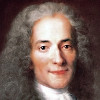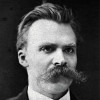“ a well-constituted man, a man who is one of "Nature's lucky strokes," must perform certain actions and instinctively fear other actions ”
Friedrich Nietzsche, Twilight of the Idols (1889). copy citation
| Author | Friedrich Nietzsche |
|---|---|
| Source | Twilight of the Idols |
| Topic | action fear |
| Date | 1889 |
| Language | English |
| Reference | |
| Note | Translated by Anthony M. Ludovici |
| Weblink | https://www.gutenberg.org/files/52263/52263-h/52263-h.htm |
Context
“Every morality and every religion is this Imperative—I call it the great original sin of reason,—immortal unreason. In my mouth this principle is converted into its opposite—first example of my "Transvaluation of all Values": a well-constituted man, a man who is one of "Nature's lucky strokes," must perform certain actions and instinctively fear other actions; he introduces the element of order, of which he is the physiological manifestation, into his relations with men and things. In a formula: his virtue is the consequence of his good constitution. Longevity and plentiful offspring are not the reward of virtue, virtue itself is on the contrary that retardation of the metabolic process which, among other things, results in a long life and in plentiful offspring, in short in Cornarism.”
source


